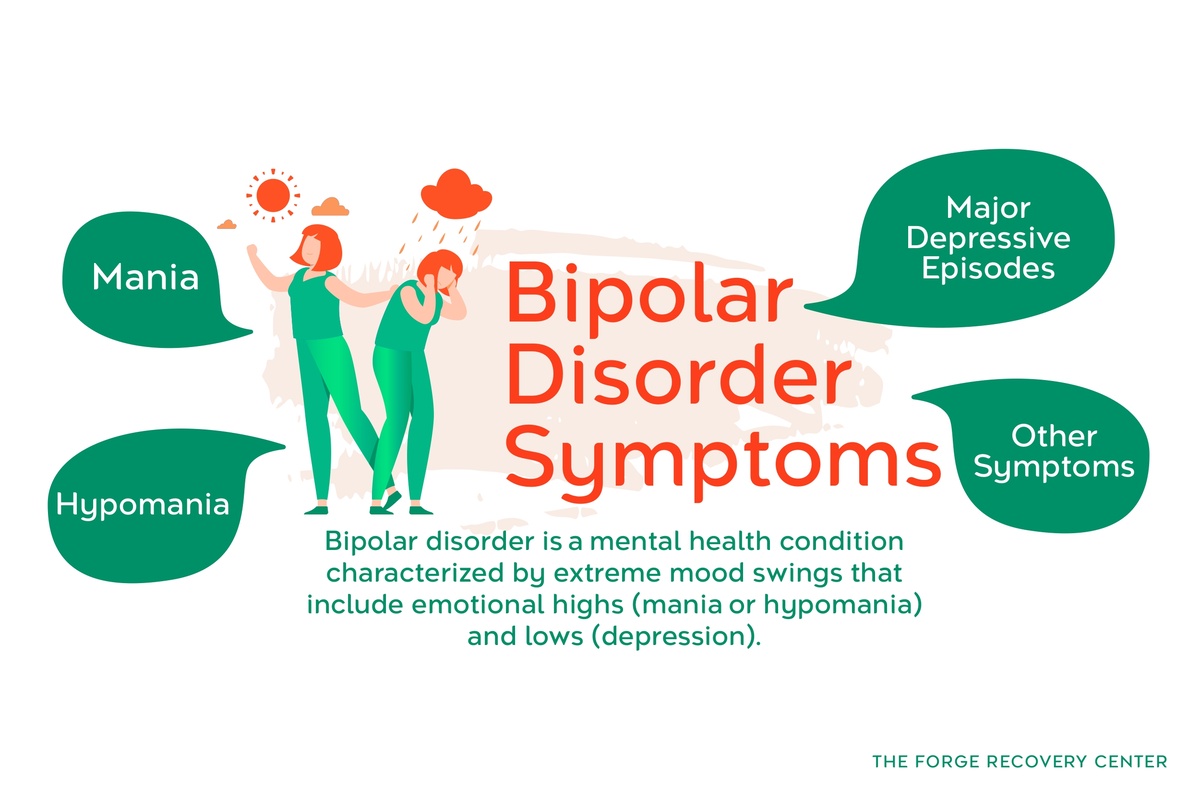Bipolar Disorder: Understanding Symptoms & Treatment Options


Bipolar disorder is a mental health condition marked by extreme mood swings, and we understand how these fluctuations can disrupt the flow of daily life. But you’re not alone, and treatment is available, typically combining medication and therapy to manage symptoms and reduce episode frequency. Learn more about symptoms and treatment options — and if you or a loved one need professional support, The Forge Recovery Center is here to help.
What Is Bipolar Disorder?
Bipolar disorder is a mental health condition characterized by extreme mood swings that include emotional highs (mania or hypomania) and lows (depression). These mood swings can affect a person's energy levels, ability to think clearly, and behavior. Bipolar disorder is a chronic illness that requires lifelong management, but with proper treatment, individuals with bipolar disorder can lead fulfilling lives.
Types of Bipolar Disorders
When it comes to bipolar disorders, it's crucial to understand the distinctions among them. Bipolar I is characterized by manic episodes lasting at least seven days, often leading to hospitalization. In contrast, Bipolar II involves both depressive and hypomanic episodes but no full-blown mania. Cyclothymic disorder entails numerous periods of hypomanic symptoms and mild depression over at least two years.
In bipolar disorder, rapid cycling occurs when you experience four or more mood episodes within a year. This condition intensifies the challenges of managing your symptoms and treatment effectively. Each type of bipolar disorder presents unique symptom variations: from severe manic episodes in Bipolar I to milder hypomanic states in Bipolar II.
What Does "Bipolar" Mean?
Understanding what "bipolar" signifies is essential for recognizing this mental health condition. Essentially, bipolar disorder involves extreme mood shifts between highs (mania) and lows (depression). These fluctuations significantly impact your mood, energy levels, and ability to focus on tasks effectively.

Bipolar Disorder Symptoms
Bipolar disorder carries a set of unique symptoms, including mania, hypomania, and major depressive episodes or “lows” that can last for weeks or longer. Here’s an overview of the symptoms associated with bipolar disorder:
Mania
When experiencing a manic episode, you might feel an intense surge of energy and euphoria. Your thoughts race, leading to reckless behavior like overspending or risky decisions. These episodes typically last for at least a week and can be severe.
During mania, your emotions are heightened, making you feel invincible and unstoppable. Your behavior becomes erratic, with a decreased need for sleep and increased agitation. In Bipolar I disorder, manic episodes are more intense and can lead to hospitalization due to the extreme nature of symptoms.
Hypomania
Hypomania is a milder form of mania, where you may feel unusually energetic and productive without the extreme behaviors seen in full-blown mania. Symptoms include increased creativity, talkativeness, and impulsivity. This state is often pleasurable but can escalate into mania if not managed.
In Bipolar II disorder, hypomanic episodes are more common than full-blown mania. Despite being less severe, they can still impact your life significantly by causing disruptions in relationships or work due to impulsiveness or irritability.
Major Depressive Episodes
Depressive episodes bring feelings of overwhelming sadness, hopelessness, and worthlessness. You may lose interest in activities you once enjoyed and struggle with concentration or decision-making. These episodes can last for weeks to months.
During depressive episodes, daily tasks may seem daunting, affecting your ability to function at work or home. Seeking help during this time is crucial to receive proper diagnosis and treatment that can alleviate symptoms and improve your quality of life.
Other Symptoms
In some cases, bipolar episodes can present with mixed features, where you experience both manic and depressive symptoms simultaneously. This combination can be challenging to navigate as it creates conflicting emotions and behaviors that require specialized treatment approaches.
Experiencing mixed features adds complexity to diagnosing bipolar disorder accurately since symptoms from both poles need to be addressed effectively. Treatment plans must be tailored to manage these contrasting symptoms while ensuring stability in mood regulation.

Are You Struggling with Mental Health or Addiction?
We Can Help. Call Us Now!
CALL: 877-839-1772
How to Treat Bipolar Disorder
Treatment for bipolar disorder typically involves a mix of therapy and medication. You can expect cognitive-behavioral therapy (CBT) sessions with a therapist, along with medications such as mood stabilizers, antipsychotics, and antidepressants — but the scope of treatment is different for every person. Mental health professionals, as well as mental health and addiction treatment centers, commonly administer treatment. Here’s a more in-depth look at the treatment process:
Therapy
When managing bipolar disorder, therapy plays a crucial role in your treatment plan. Cognitive-behavioral therapy (CBT) is particularly beneficial for individuals with bipolar disorder. CBT helps you identify and change negative thought patterns, enhancing your ability to manage mood episodes effectively. This type of therapy equips you with coping strategies to navigate the highs and lows associated with bipolar disorder.
Medication
In treating bipolar disorder, various medications are utilized to stabilize mood swings. Common medications include mood stabilizers, antipsychotics, and antidepressants. Adhering to your medication regimen is essential for managing symptoms effectively. While these medications can be highly effective, it's important to be aware of potential side effects such as weight gain, drowsiness, or tremors that may occur.
Mental Health & Addiction Treatment Centers
Specialized care at mental health and addiction treatment centers offers comprehensive support for individuals with bipolar disorder. These centers provide an integrated approach to address both mental health issues and substance abuse disorders that often co-occur with bipolar disorder. Seeking treatment at these centers ensures that you receive tailored care that addresses all aspects of your well-being.
What Causes Bipolar Disorder?
When it comes to bipolar disorder, genetic factors play a significant role in its development. Your genetic makeup can increase the likelihood of developing this condition. Understanding the heritability of bipolar disorder is crucial in recognizing the risk factors associated with it.
Genetic predisposition can be passed down from one generation to another, impacting your susceptibility to bipolar disorder. This link emphasizes the importance of family history in assessing your risk for the condition. Recognizing the genetic component of bipolar disorder aids in early detection and effective treatment strategies.
Are You Struggling with Mental Health or Addiction?
We Can Help. Call Us Now!
CALL: 877-839-1772
Effects of Bipolar Disorder
The mood and energy fluctuations brought on by bipolar disorder can have significant effects on daily life. Medications used in treatment also have the potential to cause side effects, and occurring mental health conditions could add another layer of difficulty to symptom management — highlighting the need for communication with your healthcare team. Here’s a summary of the effects that bipolar disorder can have on daily life and more:
On Daily Life
Living with bipolar disorder can significantly impact your daily activities. Managing bipolar symptoms, which may include manic episodes, depressive episodes, or hypomanic episodes, may pose challenges, affecting work, relationships, and self-care routines. The unpredictable nature of mood changes can disrupt your daily schedule.
Coping with the disruptions caused by bipolar disorder requires self-awareness and effective strategies. Establishing a routine, practicing stress management techniques, and seeking support from friends and family can help you navigate through the challenges. Educating yourself about the mental health condition and its triggers is crucial for better management.
Medication Side Effects
Common medications used to treat bipolar disorder may come with side effects that can affect your well-being. These side effects include weight gain, drowsiness, and gastrointestinal issues. It's essential to be aware of these potential effects to address them promptly.
Managing medication side effects involves open communication with your healthcare provider. Reporting any discomfort or adverse reactions promptly allows for adjustments in medication dosage or alternative treatments. Adhering to prescribed medication schedules and discussing concerns with your healthcare team are vital steps in managing side effects effectively.
Co-Occurring Mental Health Conditions
Bipolar disorder often co-occurs with other mental disorders such as anxiety disorders or substance abuse issues. Managing these co-occurring disorders alongside bipolar disorder can be challenging due to overlapping symptoms and treatment complexities.
Integrated treatment approaches that address both bipolar disorder and co-occurring conditions simultaneously are crucial for holistic care. Collaborating with a multidisciplinary healthcare team comprising psychiatrists, therapists, and social workers can provide comprehensive support tailored to your specific needs.

Diagnosing Bipolar Disorder
Bipolar disorder is diagnosed according to criteria found in the DSM-5, and involves an initial clinical assessment to review your symptoms, medical history, and family history. Seeing as bipolar disorder is frequently inherited, this information is crucial to gather. Here’s how the diagnosis process works:
Diagnostic Criteria
Mental health professionals diagnose bipolar disorder by assessing your symptoms, medical history, and family history. They use the criteria outlined in the Diagnostic and Statistical Manual of Mental Disorders (DSM-5). Accurate diagnosis is crucial for determining the most effective treatment plan.
When diagnosing bipolar disorder, professionals look for specific criteria such as the presence of manic or hypomanic episodes, depressive episodes, and the duration of these mood swings. The criteria also consider the impact of these episodes on your daily life functioning. A comprehensive evaluation helps in distinguishing bipolar disorder from other mental health conditions.
An accurate diagnosis ensures that you receive appropriate treatment tailored to your specific needs. It enables mental health professionals to develop a personalized treatment plan that may include medications, therapy, and lifestyle modifications. Effective treatment can help manage symptoms, reduce mood swings, and improve overall quality of life.
Initial Clinical Assessment
During the initial clinical assessment for bipolar disorder, healthcare providers gather information about your symptoms, medical history, and family history. This process involves detailed discussions about your mood changes, energy levels, sleep patterns, and any past episodes of mania or depression. Comprehensive information helps in understanding the nature and severity of your condition.
The initial assessment plays a crucial role in guiding treatment planning for bipolar disorder. By obtaining a thorough understanding of your symptoms and experiences, healthcare providers can recommend appropriate interventions to manage your condition effectively. Treatment planning may involve a combination of medication management, psychotherapy, and lifestyle adjustments.
Are You Struggling with Mental Health or Addiction?
We Can Help. Call Us Now!
CALL: 877-839-1772
Bipolar Disorder Prevalence
Global Prevalence
There is moderate to solid evidence that bipolar disorder impacts about 1% of the global population (lifetime prevalence), with a one-year prevalence of around 0.5%. However, these numbers rise when the discussion shifts to U.S. prevalence.
U.S. Prevalence
Bipolar disorder affects approximately 2.8% of adults in the United States, according to the National Institute of Mental Health. The prevalence of bipolar disorder is similar among men and women, but there may be differences in the age of onset. Research suggests that the average age of onset for bipolar disorder averages between 12 and 24 years old. However, bipolar disorder can develop at any age, with some individuals experiencing symptoms in childhood or later in life.
Impact of Age
The prevalence of bipolar disorder varies across different age groups. Onset typically occurs in late adolescence or early adulthood, but it's essential to note that individuals of all ages can be affected by this condition.
Adolescents: Approximately 1% of adolescents experience symptoms consistent with bipolar disorder.
Adults: The prevalence increases to around 2.6% among adults aged 18 and older.
Elderly: In older adults aged 60 and above, the prevalence decreases slightly to about 0.5%.

Closing Thoughts
Now that you understand bipolar disorder, its symptoms, treatment options, causes, effects, diagnosis, management, and prevalence, you are equipped with valuable knowledge to navigate this complex condition. Remember, early detection and seeking professional help are crucial in managing bipolar disorder effectively. By recognizing the signs and symptoms early on, you can take proactive steps to address them and lead a fulfilling life.
Take charge of your mental health by staying informed, seeking support from healthcare professionals, and creating a strong support system. Remember that you are not alone in this journey. With the right resources and strategies in place, managing bipolar disorder is possible. Stay proactive, prioritize self-care, and reach out for help when needed. Your well-being matters.
Are You Struggling with Mental Health or Addiction?
We Can Help. Call Us Now!
CALL: 877-839-1772
Bipolar Disorder Treatment in Orange County
Bipolar disorder can make life feel like a storm of sorts, with its unpredictable mood fluctuations causing disruption and distress in day-to-day life. The highs of mania and the lows of depression can feel overwhelming, impacting your daily life and relationships — and we’re here to remind you that help is available.
At The Forge Recovery Center, our team of mental health and treatment professionals is here to support you with a range of therapies that you can explore below. Call us today, whether you or a loved one are in need of support.
Treatment Modalities We Offer
At The Forge Recovery Center, we employ scientifically-backed treatment approaches to manage mental health struggles, including:
Case Management
Our experts steer clients toward resources that support recovery, evaluating personal risks to formulate a thorough treatment plan.
CBT
CBT aids clients in altering negative thought cycles and behaviors tied to drug addiction, with the goal of preventing relapse and promoting a drug-free lifestyle.
DBT
DBT aids those battling emotional instability from substance abuse, promoting emotional control and positive life alterations.
EMDR
EMDR enables clients to process the trauma that may influence their addiction, utilizing eye movement techniques to lessen psychological distress.
Experiential
With experiential therapy, patients can rekindle life’s pleasures and confront the root trauma of addictive behaviors through engaging in therapeutic activities.
Family Counseling
Family therapy strengthens family bonds and nurtures a supportive network crucial for sustained recovery and abstinence.
Group Therapy
Group therapy offers a communal space for support, enhancing recovery through shared experiences and collective resilience.
Individual Therapy
Individual therapy focuses on the distinct challenges each client faces, supporting their journey towards a life free from substances.
MAT
MAT merges approved medications with counseling to effectively fight addiction, alleviating withdrawal symptoms and minimizing relapse risk.
TMS
TMS, a non-invasive technique, employs magnetic fields to stimulate the brain, aiding in reducing intense drug cravings.
Motivational Interviewing
This strategy motivates clients to make healthier decisions, such as overcoming cocaine addiction, by cultivating self-efficacy.
Trauma-Informed Care
Acknowledging trauma’s influence on addiction, this approach is proven effective in guiding clients through treatment and understanding its impact on their mental and emotional well-being.



